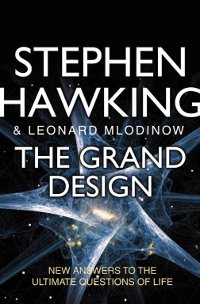Conclusion In “The Grand Design”, Hawking and Mlodinow discuss the big questions of modern physics. The subject matter is engrossing, but the hurried presentation leaves the reader unsatisfied.

“All science is either physics or stamp collecting.”
 There is a definite ring of truth to this famous statement, but because my chances of becoming a physicist are slim, the best I can do is occasionally pick up a popular science book. And, of course, no one has popularized physics like Stephen Hawking, the enigmatic disabled genius.
There is a definite ring of truth to this famous statement, but because my chances of becoming a physicist are slim, the best I can do is occasionally pick up a popular science book. And, of course, no one has popularized physics like Stephen Hawking, the enigmatic disabled genius.
A great deal has been made of Hawking's newest book, “The Grand Design”, which he has written together with Leonard Mlodinow. Especially the superfluous statement that there is no God (or something to that effect) caused a small stir in the press, even in our not particularly pious country.
Unfortunately, “The Grand Design” does not live up to the hype. The book is entertaining, but there is little to set it apart from the competition. Hawking and Mlodinow start out with a very brief introduction to the philosophy of science. From there they fly by quantum mechanics, glance over string theory, and, a mere 150 pages later (large font, lots of pictures), they arrive at the grand conclusion. In this conclusion they appear to say something important, perhaps even brilliant, about how the total energy of the universe is zero, which would allow the universe to appear out of nothing (or something along those lines). But the problem with the conclusion, and the book in general, is that the ideas are presented too hurriedly. The reader is left unsatisfied, not being given the time to come to grips with the complex ideas. Also, “The Grand Design” is filled with little jokes. None of them are very funny and they quickly become annoying.
Of course, you must admire that Hawking is still able and motivated to write books at all. This is undoubtedly a huge undertaking and, I suspect, his disability is part of the reason why the book is so short. But nevertheless I am forced to conclude that there are better books out there, which deal with essentially the same subject matter. You may want to consider books by Lee Smolin or Leonard Susskind. One of Susskind's best books, "The Black Hole War", actually deals with his personal battle of minds with Hawking. Their "war" had to do with whether or not black holes destroy information. In the process of explaining the technicalities of their dispute in layman's terms, Susskind gives a personal, and at times moving, account of his encounters with Stephen Hawking. But I digress.
In conclusion, “The Grand Design” is a reasonably entertaining book about modern physics. If you are seeking the “new answers to the ultimate questions of life” that are promised by the subtitle you will be disappointed. If you have a specific interest in Stephen Hawking you may find the book worthwhile.
Get this book on amazon.com
, amazon.co.uk
or bol.com.



